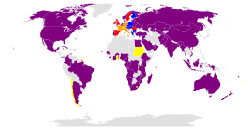| Cape Town Convention on International Interests in Mobile Equipment | |
|---|---|
 Parties Signatories Parties, also covered by EU's accession Signatories, also covered by EU's accession covered by EU's accession | |
| Signed | 16 November 2001 |
| Location | Cape Town, South Africa |
| Effective | 1 March 2006 |
| Condition | 3 ratifications |
| Parties | 84 |
| Depositary | International Institute for the Unification of Private Law |
| Citations | 2307 U.N.T.S. 285 |
| Languages | English, Arabic, Chinese, French, Russian and Spanish |
| Full text | |
The Cape Town Convention on International Interests in Mobile Equipment, or Cape Town Treaty, is an international treaty intended to standardize transactions involving movable property. The treaty creates international standards for registration of contracts of sale (including dedicated registration agencies), security interests (liens), leases and conditional sales contracts, and various legal remedies for default in financing agreements, including repossession and the effect of particular states' bankruptcy laws.
Contents
- Signatures and ratifications
- European Union
- Protocols
- Aircraft Protocol
- Railway Rolling Stock
- Space Assets
- Mining, Agricultural, and Construction (MAC) Equipment
- References
- External links
Four protocols to the convention are specific to four types of movable equipment: Aircraft Equipment (aircraft and aircraft engines; signed in 2001), railway rolling stock (signed in 2007), space assets (signed in 2012) and "Mining, Agricultural and Construction Equipment" (signed in 2019). The aircraft Protocol entered into force in 2006, and the railway rolling stock Protocol entered into force in 2024. [1] The others are not yet in effect.
The treaty resulted from a diplomatic conference held in Cape Town, South Africa in 2001. The conference was attended by 68 countries and 14 international organizations. 53 countries signed the resolution proposing the treaty. [2] The treaty came into force on 1 March 2006, [3] and has been ratified by 57 parties. The Aircraft Protocol (which applies specifically to aircraft and aircraft engines) took effect on 1 March 2006 when it was ratified by 9 countries: Ethiopia, Ireland, Malaysia, Nigeria, Oman, Panama, Pakistan, and the United States.
